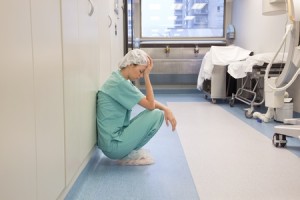Doctors still face sleep deficit problems
Perhaps thanks to TV drama, it’s becoming a bit of a cliche´: the tired young doctor sneaking a few minutes of precious sleep in a broom closet. TV trope or not, it’s true. Physicians and residents simply aren’t getting enough sleep, regardless of their age or number of years on the job. 
But how does this impact patient safety?
Research says yes.
Research consistently finds that doctors are often chronically sleep-deprived. A study from the British Medical Association found that a shocking 71% of doctors reported not having adequate rest time following a night on-call. Another 1 in 10 doctors reported undisturbed rest is actually quite rare.
A frequently-cited study on sleep deprivation from 2000 found that just 28 hours of sleep deprivation can impair a person’s function to the same degree as if their blood alcohol content (BAC) level was .10%. That level is above the federal standard of a .08% BAC for intoxication.
For many doctors, work requires long hours, changing and demanding schedules and on-call shifts.
A study from 2013 found that on-call shifts were one of the biggest components of sleep deprivation. The study found that periods of acute sleep deprivation that can occur during on-call shifts affect physicians’ mood and alertness. This then negatively affects their performance and puts patients at risk.
Surgeons often report being on-call and possibly being up the night before a complicated surgery. And there are no regulations governing rest periods in a private practice.
Bad for patients.
Tired doctors are more prone to mistakes, according to research. One study found that surgeons who had not slept enough made 20% more errors and took 14% longer to complete tasks than doctors with an adequate night’s sleep.
Bad for doctors.
Sleep deprivation doesn’t just affect patients. It also affects the health of doctors. Sleep deprivation puts all individuals at risk for many diseases, such as Type 2 diabetes, obesity, cardiovascular disease, among others.
One study in the American Journal of Surgery found night shift work has a measurable impact on a surgeon’s circadian rhythm. The report states chronic sleep deprivation combined with work during the night negatively impacts performance and patient safety.
Should patients have the right to ask their surgeons or doctors if they have had a good night’s rest? The fact is, even though working with fatigue has been a part of the culture of medicine for quite a long time, it’s time for a change.
Perhaps now is the time to figure out what we can do to make sure those who hold our lives in their hands have gotten enough sleep the night before.







